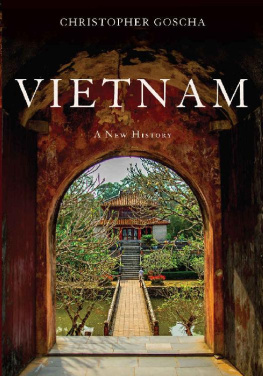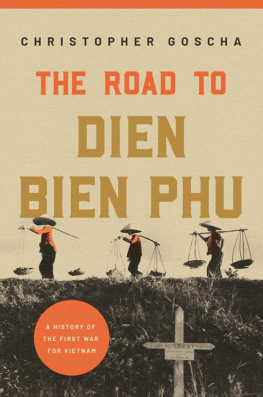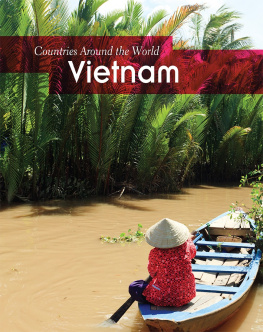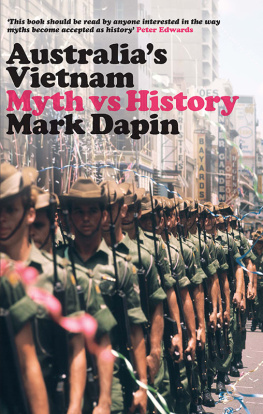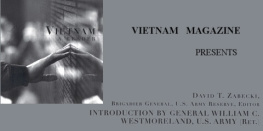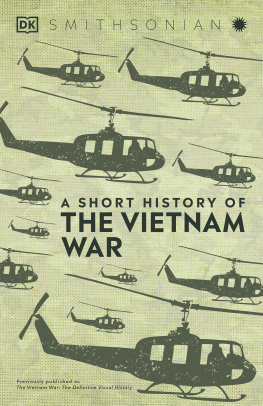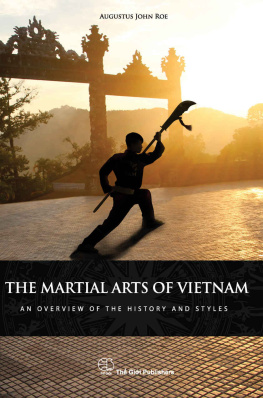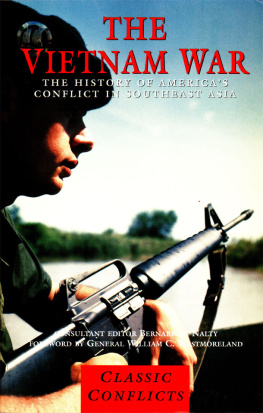Christopher Goscha - Vietnam: A New History
Here you can read online Christopher Goscha - Vietnam: A New History full text of the book (entire story) in english for free. Download pdf and epub, get meaning, cover and reviews about this ebook. year: 2016, publisher: Basic Books, genre: Politics. Description of the work, (preface) as well as reviews are available. Best literature library LitArk.com created for fans of good reading and offers a wide selection of genres:
Romance novel
Science fiction
Adventure
Detective
Science
History
Home and family
Prose
Art
Politics
Computer
Non-fiction
Religion
Business
Children
Humor
Choose a favorite category and find really read worthwhile books. Enjoy immersion in the world of imagination, feel the emotions of the characters or learn something new for yourself, make an fascinating discovery.
- Book:Vietnam: A New History
- Author:
- Publisher:Basic Books
- Genre:
- Year:2016
- Rating:3 / 5
- Favourites:Add to favourites
- Your mark:
- 60
- 1
- 2
- 3
- 4
- 5
Vietnam: A New History: summary, description and annotation
We offer to read an annotation, description, summary or preface (depends on what the author of the book "Vietnam: A New History" wrote himself). If you haven't found the necessary information about the book — write in the comments, we will try to find it.
Vietnam: A New History — read online for free the complete book (whole text) full work
Below is the text of the book, divided by pages. System saving the place of the last page read, allows you to conveniently read the book "Vietnam: A New History" online for free, without having to search again every time where you left off. Put a bookmark, and you can go to the page where you finished reading at any time.
Font size:
Interval:
Bookmark:


Copyright 2016 by Christopher Goscha
Published in the United States by Basic Books, an imprint of Perseus Books, a division of PBG Publishing, LLC, a subsidiary of Hachette Book Group, Inc.
All rights reserved. Printed in the United States of America. No part of this book may be reproduced in any manner whatsoever without written permission except in the case of brief quotations embodied in critical articles and reviews. For information, address Basic Books, 250 W. 57th St, 15th floor, New York, NY 10107.
Books published by Basic Books are available at special discounts for bulk purchases in the United States by corporations, institutions, and other organizations. For more information, please contact the Special Markets Department at the Perseus Books Group, 2300 Chestnut Street, Suite 200, Philadelphia, PA 19103, or call (800) 810-4145, ext. 5000, or e-mail .
Library of Congress Cataloging-in-Publication Data
Names: Goscha, Christopher E., author.
Title: Vietnam: a new history / Christopher Goscha.
Description: New York: Basic Books, [2016] | Includes bibliographical references and index.
Identifiers: LCCN 2016017630 (print) | LCCN 2016018484 (ebook) | ISBN 9780465094370 (ebook)
Subjects: LCSH: VietnamHistory. | VietnamColonization.
Classification: LCC DS556.5 . G66 2016 (print) | LCC DS556.5 (ebook) | DDC 959.7dc23
LC record available at https://lccn.loc.gov/2016017630
Editorial production by Christine Marra, Marrathon Production Services. www.marrathon.net
BOOK DESIGN BY JANE RAESE
Set in 12-point Bulmer
10 9 8 7 6 5 4 3 2 1
FOR GEETA & NAYAN CHANDA
CONTENTS
Over the last fifty years, a wide range of scholars has produced an exciting body of scholarship on Vietnam. Without access to it, I would have never been able to write this book. In many ways, Im standing on their shoulders and I hope that I have done them justice in the pages that follow. It is impossible to cite each of them here; the list would go on for pages. While they may not always agree with everything I advance, I wish to thank them and those who kindly took the time out of their busy schedules to read and comment on draft chapters, provide references, or make suggestions for improving the book. In no particular order, they are: Agathe Larcher, Nola Cooke, Liam Kelley, Li Tana, Philip Taylor, Kathlene Baldanza, George Dutton, Jon Heit, Mark Lawrence, Keith Taylor, Christopher and Susan Bayly, Shawn McHale, Geoff Wade, Phi Van Nguyen, Franois Guillemot, Sophie Quinn-Judge, Nguyen Quoc Thanh, Tuong Vu, Nasir-Carime Abdoul, Philippe Papin, David Marr, Charles Keith, Peter Zinoman, Olga Dror, Emmanuel Poisson, and William Turley.
Words matter. Most problematic of all in this book is the word Vietnam itself. While tribes referring to themselves as Viet emerged in around the third century BCE from present-day southern China to the Red River valley, at no time before 1802 did these people ever call their kingdoms, dynasties, or states Vietnam. Upon creating a unitary state running from the Red River basin to the Mekong delta in 1802, Emperor Gia Long had first wanted to call his new country Nam-Viet or the Viet of the South. Worried that the use of this term implied expansionist designs on Chinas southern territories, the Chinese emperor reversed the word order to form the term Viet-Nam (which I render in English simply as Vietnam). In 1804, Gia Long accepted this Chinese-devised coupling as recognizing the independent state he had just created running from north to south. The Chinese continued to refer to it by their old appellation dating from Tang times, An-Nam, meaning the Settled Land of the South. The term Vietnam did not last long under the Nguyen, however. In 1813, the court briefly revived the term Dai Viet (Greater Viet) and, in 1838, Gia Longs son, Minh Mang, who ruled after him, changed the kingdoms name to Dai Nam (the Greater South). Subsequent Nguyen rulers used this term until mid-1945. An artificial appellation then, Alexander Woodside writes of the term Vietnam, it was used extensively neither by the Chinese nor by the Vietnamese. The word only took off when nationalists like Tran Trong Kim and Ho Chi Minh used Vietnam as the name for the nation-states they declared independent in 1945.
Further complicating the matter is the multitude of Vietnams under study in this narrative. Not only is the use of the term Vietnam for the period prior to 1945 anachronistic (except between 1802 and 1813), but the question also arises as to which Vietnam we mean. From the seventeenth century onward, two Vietnams existed: one in the Red River delta based around Hanoi, the other expanding into the Mekong delta with its capital in Hue. The same problem arises after 1945, when Ho Chi Minhs Democratic Republic of Vietnam competed with Bao Dais Associated State of Vietnam and Ngo Dinh Diems Republic of Vietnam. For the sake of clarity, I use the term Red River Vietnam or Dai Viet to refer to the Vietnamese polity that first emerged in the north and lasted in one form or another until the late eighteenth century. For the period between the seventeenth and eighteenth centuries, when civil conflicts gave rise to the region fracturing into several polities, I distinguish among them by speaking of Trinh Vietnam, Nguyen Vietnam, and Tay Son Vietnam. These were the three main military houses at odds with each other. This shorthand allows me to maintain clarity without burdening the reader with confusing qualifying statements. For the French colonial period, there was no Vietnam and I have mainly refrained from using the term, except from the point in time when nationalists began to revive it from the start of the twentieth century. For the post-1945 period, I use the term Vietnam to refer to the nation-states run by leaders such as Ho Chi Minh, Bao Dai, and Ngo Dinh Diem. However, when referring to these states, I will use the proper terms for eachthe Democratic Republic of Vietnam, the Associated State of Vietnam, and the Republic of Vietnam, respectively. I will not use the terms Viet Minh, les Viets, or Viet Cong to refer to the Vietnamese communists. Nor should we resort to the politically charged term Saigon regime for the Republic of Vietnam. This is not an ideological bias on my part. Rather, these words obscure a complicated but in the end fascinating story of contested sovereignties.
Finally, Vietnamwhatever its name, shape, or formhas never been an ethnically homogeneous polity. A wide range of ethnic groupsand they did not become ethnic minorities (dan toc thieu so) until the emergence of nation-states in the mid-twentieth centurydominated large parts of present-day Vietnam. These peoples occupy an important place in the history of modern Vietnam and cannot be simply subsumed under the homogenizing, nationalist term Vietnamese. For centuries, they were not Vietnamese, and many still do not want to be. Chapter 14 of this book is specifically the story of these non-Viet peoples. When I need to make an ethnic distinction between the two groups, I will use the word Viet instead of Vietnamese, much as one distinguishes the Han, the ethnic Chinese majority in China, from other ethnic groups there, such as the Tibetans or Uyghers. Again, this is not mere political correctness on my part. Words count, and by using them precisely and carefully, they can help us to shed new light on the complexity of Vietnam in a plural rather than singular or homogenizing sense. That said, I have done my best not to let these semantic concerns muddle the narrative or side-track readers. There will admittedly be times when the words Vietnam or Vietnamese as well as China and Chinese appear in my narrative in a general way, because not to have done so would have simply risked losing the reader.
Next pageFont size:
Interval:
Bookmark:
Similar books «Vietnam: A New History»
Look at similar books to Vietnam: A New History. We have selected literature similar in name and meaning in the hope of providing readers with more options to find new, interesting, not yet read works.
Discussion, reviews of the book Vietnam: A New History and just readers' own opinions. Leave your comments, write what you think about the work, its meaning or the main characters. Specify what exactly you liked and what you didn't like, and why you think so.

